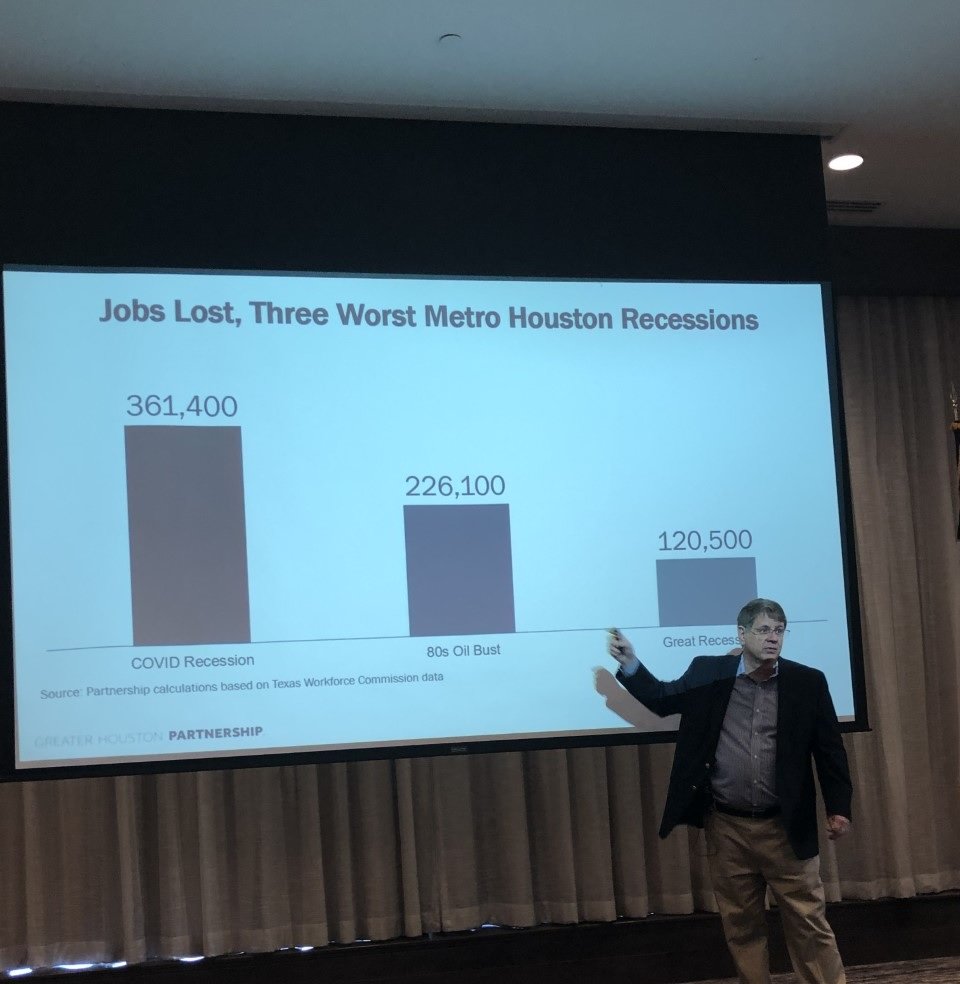Omicron variant impacts area economy, but jobs remain plentiful
The Omicron variant is not expected to precipitously impact the local economy despite health concerns, a Greater Houston Partnership official said Tuesday.
This item is available in full to subscribers.
Attention subscribers
To continue reading, you will need to either log in to your subscriber account, below, or purchase a new subscription.
Please log in to continue |
Omicron variant impacts area economy, but jobs remain plentiful
The Omicron variant is not expected to precipitously impact the local economy despite health concerns, a Greater Houston Partnership official said Tuesday.
Patrick Jankowski is the partnership's senior vice president of research. He spoke at a Katy Area Economic Development Council meeting at the Embassy Suites.
U.S. hospitals are receiving over 800,000 COVID cases per day, Jankowski said. This is more than triple the number of daily cases from a year ago. In February 2021, Jankowski said, hospitals received about 250,000 COVID cases per day. The patients reporting to the hospitals for COVID treatments are primarily unvaccinated.
Jankowski said over 70% of Americans has had at least one shot. He said the vaccinations should help cut the impact of the Omicron variant.
“The death rate isn’t as high as the infection rate is,” Jankowski said. “It is much more easily spread, but not quite as deadly. The concern in the U.S. is that the number of cases is overwhelming hospitals.”
Jankowski said the Omicron variant will have less impact because people are better managing possible COVID-19 exposure situations.
People are wearing masks, getting vaccinated, working from behind plastic barriers, and practicing social distancing. All these activities have lowered the disruptive nature of the pandemic, Jankowski said.
“Each new variant that comes out has less and less impact on the economy,” Jankowski said.
Jankowski said the pandemic caused the worst local job market in recent memory. Jankowski said the three worst metropolitan Houston recessions were COVID-19 recession, with 361,000 jobs lost; the 1980s oil bust (226,100); and the 2008-09 Great Recession (120,500). The market lost more jobs in the pandemic than the other two events combined, Jankowski said.
But the jobs are returning as the economy recovers. Since May 2020, Jankowski said, 297,500 jobs have come back. About 63,900 of those jobs returned during the first 11 months of 2021. The final statistics for 2021 are expected later this month, Jankowski said.
Jankowski said some industries have come back faster than others. Administrative support, educational services, and finance and insurance are among those that have recovered the fastest.
Health care, professional, scientific, and trade services, retail, transportation and warehousing are other areas that have recovered, he said.
Arts, entertainment, recreational industries, including restaurants and bars, have made significant progress toward recovery, Jankowski said. The energy industry—both in exploration and services—has also made progress, he said.
Industry sectors that are struggling include construction, government and hotels. Jankowski said. Other sectors include manufacturing, real estate, and wholesale trade.
Companies are working hard to keep their workers. Jankowski cited a National Federation of Independent Business study that said 49% of those businesses surveyed have unfilled positions. About 10.5 million jobs are open right now, he said.
“Layoffs are unlikely because businesses are having labor retention issues right now,” Jankowski said.
Keywords
Katy Area EDC, economic development, COVID-19







